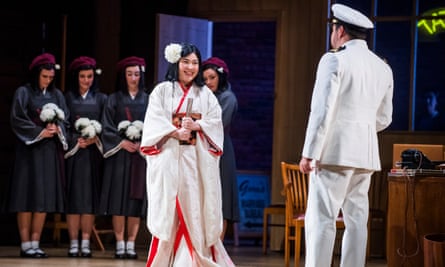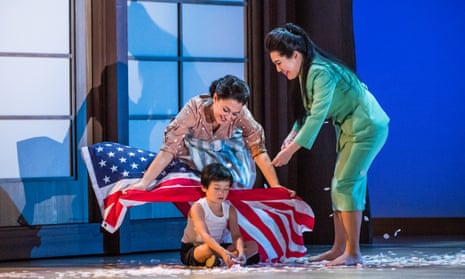Annilese Miskimmon’s production of Madama Butterfly for Glyndebourne’s tour updates Puccini’s tragedy to the 1950s and presents us with a hard-edged view of an opera that some persist in seeing as primarily Romantic. Always one to rethink key works in the repertory, Miskimmon attempts an at times scathing study of exploitation and its consequences, though in so doing she is only partly successful. This is a staging that engages the mind, sometimes at the price of the work’s emotional impact.
The first act is relocated to Goro’s marriage bureau in a tatty suburb of Nagasaki, where Matteo Lippi’s Pinkerton is but one of many American servicemen keen to take advantage of the local custom of a conveniently dissolvable marriage. We’re aware of the ghastly monetary quality of it all as wads of banknotes change hands. Men pick out women from catalogues. A slide show unnervingly reveals Karah Son’s Butterfly as already taken.
The first intimation of catastrophe comes when she arrives with her family, suitcase in hand, ready to start a new life, unlike the other girls, who pitch up alone, casual and knowing.

Yet in forcefully underscoring points, Miskimmon is in danger of cramping her own style. We are still in the marriage bureau for the act-one love duet, during which Butterfly and Pinkerton watch a documentary about GI brides – she is hopefully fascinated, he uncomfortable – while Goro (Alun Rhys-Jenkins) counts up the cash. The scene is oddly chilly and too divergent from the passion in the score.
The second half is more balanced. Butterfly persists in wearing the two-piece suit that Pinkerton gave her as a present, and drapes their son in one of his father’s cast-off navy jackets to present him to Francesco Verna’s Sharpless. Kate (Marta Fontanals-Simmons), Pinkerton’s “real American wife” is a glacial Tippi Hedren lookalike, who arrives with a swanky battleship toy for the boy she is unfeelingly about to adopt. The ending disturbs, leaving us wondering what the long-term consequences might be for her son of Butterfly’s suicide in his presence.
The inequalities, however, are not just theatrical. Vocally, this is variable, with the men better than the women. Son has an appealing voice that can thrill at full throttle, but could do with more variety of colour and verbal subtlety. Claudia Huckle as her maid Suzuki is affecting if at times overly reined-in. She and Son sound good together in the Flower Duet.
Lippi, though, makes a marvellous Pinkerton, with his bronze tone and ardent phrasing: he’s curiously sympathetic, too, as genuine remorse takes over at the end. Verna’s Sharpless, meanwhile, is beautifully sung, and carefully characterised as a reticent, stiff-backed bureaucrat increasingly adrift in an emotional situation over which he has no control. In the pit, John Wilson, making his Glyndebourne debut, conducts his first opera as one born to it, with bags of passion and a wonderfully instinctive feel for the ebb and flow of the score.

Comments (…)
Sign in or create your Guardian account to join the discussion